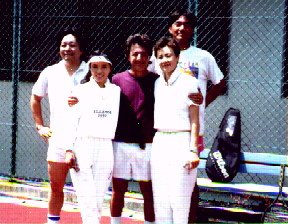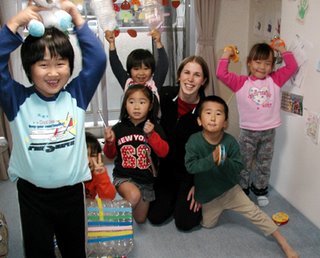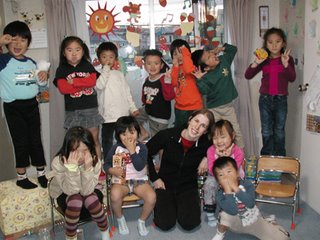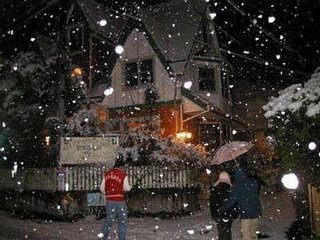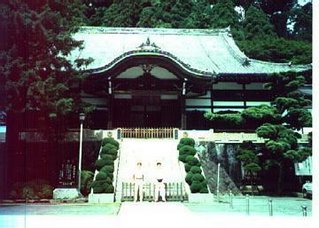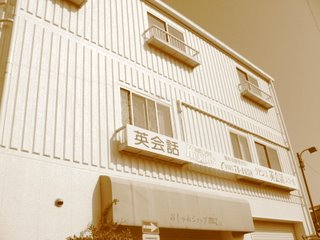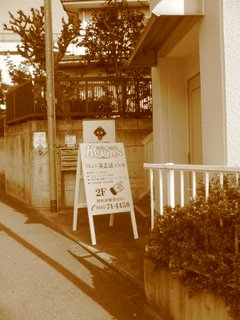
Pictured, the entrance to our Shibusawa School in Hadano City
One Year Contract -- Renewable*Must have a University Degree. B.ed or other teaching relateddegree preferred but not necessary. TESL, TESOL, TEFL, RSA or other TESL or TEFL Training and/or previous experience preferred.
*Teach in a Canadian, Victorian House (materials imported from Cloverdale, British Columbia, a river-side cottage like schoolwith a Canadian style General Store on the first floor, and someother very cozy schools in Kanagawa, Japan.
Our Tsukahara School is in a cottage-like building a stone`s throw from the Kari River. Both of our Minami Ashigara schools are in a pretty river valley. This school has a cowboy townlike veranda surrounding the first floor`s General Store.
Our Anne School (Minami Ashigara) is a Canadian Victorian style house. The materials were imported from Cloverdale, British Columbia.
Our Hadano School is in a very nice and bright apartment in Hadano`s interesting Shibusawa area. It is conveniently located one minute from the train station.
Our Kamonomiya school is in the most desirable area of Odawara, near shops, restaurants,and the train station.
We try to create a very warm environment for our teachers and students.
Title of position:Fulltime Native English Teacher
Address:
____Iizawa 242-23, Minami Ashigara City, Kangawa Pref. 250-0122 Japan_
Telephone: _81-(0)465-74-4458_________________ Fax: ___Same
E-Mail: kevinsenglishschools@hotmail.com
WWW address: http://www.eikaiwa1.com
Contact person: ___Ikumi or Kevin Burns
Inquiries should include (please mark with an "X"):
_X_CV/resume __diploma(s) _X_letter of introduction __essay
__publications (# __) _X_photo __teaching certification(s)
__transcripts __letters of recommendation __video/audio Tape
__Other (health certificate, etc.) _
Describe position/duties: (please use additional lines if necessary)
We hire native speakers from all English speaking countries. One Year Contract.Teach children to adults and some company classes. 20-28hrs per week.Very attractive furnisheded apartment provided. Rent ¥63,000/Month No Key Money!
Free Japanese lessons provided while you work for us. Canadian owned andco-managed. The Canadian still teaches, so understands what it`s like "in thetrenches." No long crowded train travel!
You will not be a number! You will be a very important part of our team. It isour family business. If we don`t keep our teachers and students happy, we don`teat! Our business is not just about making money. We care about our teachers andstudents. When you finally leave us, you will probably shed more than a fewtears. Four weeks of paid vacation (2 weeks at Christmas and 2 weeks in thesummertime). No cliche! It is a great area to live in!
Special skills/requirements:
__Required: A university degree. We want people who don`t view teaching English as "something to do until they get a real job." This is a real job.
We want people who regard teaching English to Japanese people,as something that is very valuable to our students and to themselves asteachers; even if they don`t want to pursue teaching English as a long-term career.
Teaching English for our schools, should be something you really, really want todo. This isn`t just a job. It is an adventure. We truly believe that.
Application deadline:
None
MUST APPLICANT CURRENTLY RESIDE IN JAPAN? (Y/N) __No_________
Hours/week: _20-28Salary: _¥250,000/Month________Class load _20-28 hours per week.
*We also require part-time teachers who live in our area now, and can coverclasses when teachers are sick or on vaction. Contact Ayako Sugai if you are interestedin part-time teaching work: 74-4458. Give her your name and phone number and askher to keep you on file for vacation relief and sick leave work.
Minimum university degree(s) REQUIRED (please indicate all):
_x_BA _x_BS __MA __Ph.D. __Other _Any university degree is fine.*
We don`t accept diplomas, you must have a degree. We prefer someonewho has shown the intelligence and perseverence to complete a university degree.
University degree(s) PREFERRED
_x_BA _x_BS __MA __Ph.D. Other
Subject specialization (please indicate all):
__Education, English
Prfessional certification(s) REQUIRED (please indicate all):
__TESL/ESL __Teaching __RSA __Other
Professional certification(s) PREFERRED (please indicate all):
_x_TESL/ESL _x_Teaching _x_RSA _x_Other ___CELTA_
Experience required (years/level/etc.):
None, we will train you! We have a two week training program, in which youwill observe all of our teachers, teaching. You will be given some teachingmethodology books to study as well.
Japanese speaking ability not required.
Applicant's visa status (please indicate one):
We will sponsor and we will renew visas. *Commonwealth citizens 30 years of ageor younger can obtain a working holiday visa, which is a great visa to start with!
Accommodation is (please indicate):
_x_Included __Partially provided __Not included
__Other (or details) __x__Rent for our furnished apartment is 60,000-65,000 Yen/Month*Must pay 2,000 Yen per month leasing fee for furniture and utilities.
Position includes (please indicate all):
_x_Paid holidays _x_Completion bonus __Travel allowance
__Moving/relocation allowance _x_Paid vacation __Airfare
__Health insurance __Research allowance
__Other (or details) _____We don`t pay for airfare but you will get a \\100,000One year contract completion bonus after completing your contract.
*The best health insurance in Japan is Japanese National Health Insurance. That is what Ihave had for the past 16 years. It is very inexpensive and teachers pay for their own health insurance.
Contract information:
Length: ___1yr_____ Renewable? _Yes_______ How many times? _Until death.____
Instruct applicants to contact your institution by:
_x_Mail __Fax __Telephone _x_E-mail __In-person
__Other (or details) ______________________________________________
Other important information:
We are proud that we are very different from the large schools here. We feel that ourstudents and teachers recognize our caring attitude towards our business. Take a look at our homepage to see what I mean. Our schools are very homey and that empitomizes theteaching environment we have.
Our attitudes towards life and work are very down to earth. If that sounds likeyou then please apply!
I am a school owner, but I also teach, study yoga, write, play tennis and raisemy three beautiful children. One of our teachers Chris and I regularly playtennis together. Nora, Chris and I play soccer.
My wife Ikumi is the main manager of our schools. She is a loving wife andmother, and as well as play tennis, she paints, and does a lot of work for the kindergarten andthe community. She is fluent in English. She studied English in Scotland andCanada.
All in all, we have a great place to work.
E-Mail: kevinsenglishschools@hotmail.com
WWW address: http://www.eikaiwa1.com
Be sure to join our Forum, to see pictures of our schools and see what`s happening at Kevin`s.: http://groups.yahoo.com/group/KevinsEnglishSchools
Contact person: Ikumi or Kevin Burns
Kanagawa Living will give you a good idea of what it is like to live and work here. Also you may wantto join the Japan Living Forum this is where we talk about living and working in Japan. You can postquestions there and many knowledgeable people will answer about life and employment here.
Head Office: Ikumi & Kevin Burns, Kevin`s English Schools, Iizawa 242-23, Minami Ashigara City,Kanagawa Pref. 250-0122 Japan Fax 81-(0)465-74-4458 You don`t dial `0` from outside Japan.Best to Email us though.


